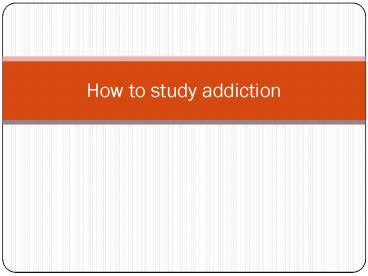How to study addiction PowerPoint PPT Presentation
1 / 22
Title: How to study addiction
1
How to study addiction
2
Types of Cocaine and Routes of Administration
- Type Street Cocaine(White Powder)
- Administration Intranasal injection
- Type Crack
- Smokable (Inhalation)
- Type Freebase Cocaine
- Inhaled
- injected
- Type Coca Leaf
- Administration Oral
3
1980s Cocaine Epidemic
- The Champagne of Stimulants
- Very expensive and difficult to obtain
- Crack - 1985
- produced by mixing cocaine HCl with baking
- soda and water. The solution is
- then heated, resulting in brittle
- sheets of cocaine that are cracked
- into small, smokable chunks or rocks.
4
Duration of Action
- The duration of action of cocaine differs greatly
from other stimulants such as amphetamines. - Effects of cocaine are much shorter-lived
- The effects of cocaine are diminished 20-80
minutes after administration - One Hour Half-Life
5
Metabolism Excretion
- Cocaine is metabolized through the kidneys
- Cocaine is present in the urine up until 12 hours
after administration - Metabolites present in urine for 2-3 days
post-administration - Chronic users possible for metabolites to be
detected in urine for up to 2 weeks
post-administration
6
Acute Chronic Effects
- Hyperactivity
- Restlessness
- Increased blood pressure
- Increased heart rate
- Euphoria
- Alertness
- Cocaines primary acute effect is when used it
raises the amount dopamine and serotonin in the
nucleus accumbens - As the drug is being eliminated from the body
- feelings of depression, a crash after the high
- No physical withdrawal, only mental
7
The Addiction Cycle
Drug addiction and relapse
Exposure to
8
Drug Self-Administration
Rat in Operant Chamber
9
Cocaine Self-Administration Reinstatement Model
Cue
Active Lever Presses
Stress
Drug Prime
10
- Reinstatement ?
- RELAPSE
11
Cocaine Self-Administration Reinstatement Model
Cue
Active Lever Presses
Stress
Drug Prime
12
Endpoint 1 Circuitry
- Can inactivate a brain area
- TTX (no action potentials)
- Lidocaine (numbing)
- Look at changes in behavior
- Acquisition
- Maintenance
- Extinction
- Relapse
13
Stereotaxic Surgery
- Stereotaxis solid arrangement
- Stereotaxic apparatus
14
The Stereotaxic atlas
- Way to navigate through the brain
- Relies on two landmarks
- Lambda bregma
- Brain areas are located by their coordinates
15
Endpoint 2 Measuring Brain Secretions
- Can measure the amount of neurotransmitter
released - Microdialysis
- Used in experimental animals
- Use stereotaxic surgery to implant cannulae in a
brain region of interest - Can measure amount what kind of
neurotransmitter is released during certain
behaviors (acquisition, maintenance, relapse)
16
Endpoint 3 Changes in behavior
- Apply treatment which is usually a drug
- Does this affect
- self-administration
- Acquisition
- Maintenance
- Sensitization
- Relapse
17
Endpoint 4 Genetic Methods
- Protein Expression
- Western blots
- Immunohistochemistry
- mRNA expression
- In situ hibridization
- Gene chips (microarrays)
- Can then use targeted mutations or expressions
- knockout animals
- Viral overexpression
18
Neuronatin
Arc
Sal
Coc
Sal
Coc
Expression Levels
Sal
Coc
Coc
Sal
19
SEARCHING FOR NEW GENES ALTERED IN THE
ADDICTED BRAIN
- Gene expression profiling expression levels of
thousands of genes are simultaneously monitored
to study the effects of certain treatments /
diseases
- DNA microarray Gene chip
20
Mesolimbic (Midbrain) DA System
REINFORCEMENT!
21
STEP1 cDNA microarray -screening for changes in
gene expression caused by acute amphetamine
Gonzalez-Nicolini and McGinty- 2004
22
STEP2 in situ hybridization - confirmation of
changes and anatomical distribution
1xAMPH (2.5mg/kg i.p.) 1h, 3h, 6h, 24h
dorsal STR
Downregulation of RGS4 levels by acute AMPH
Schwendt et al. J.Neurochem. 96 2006

